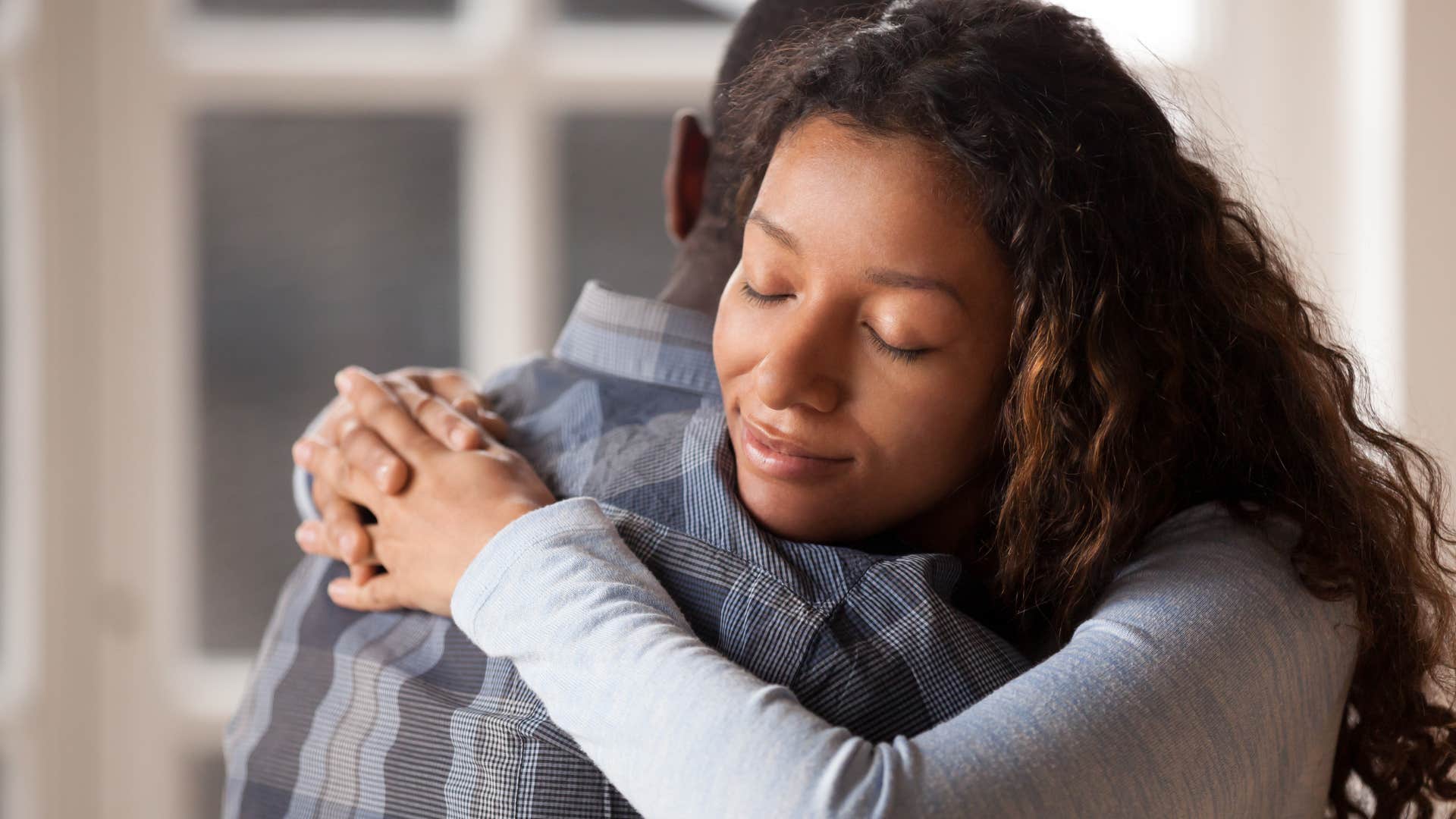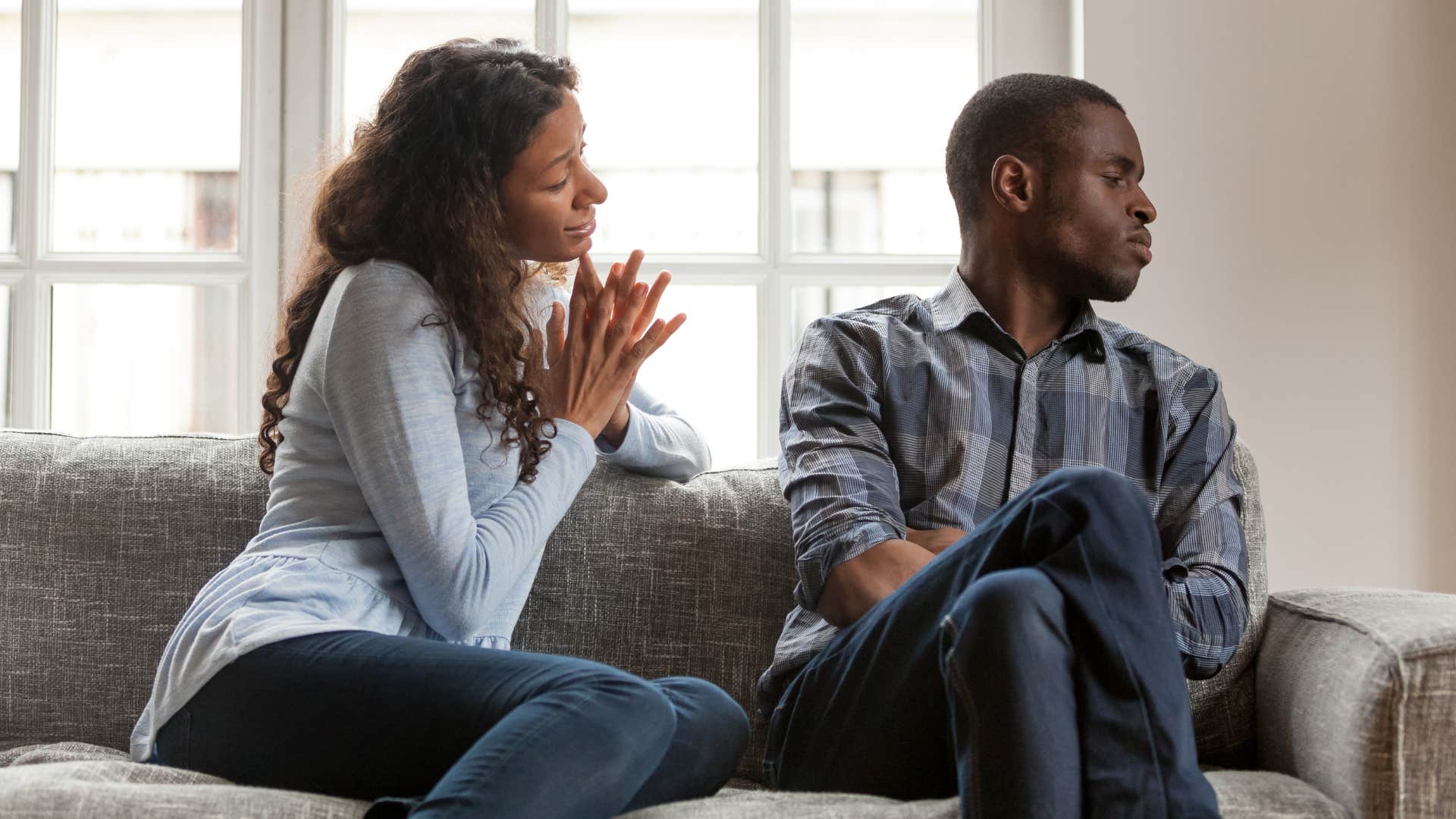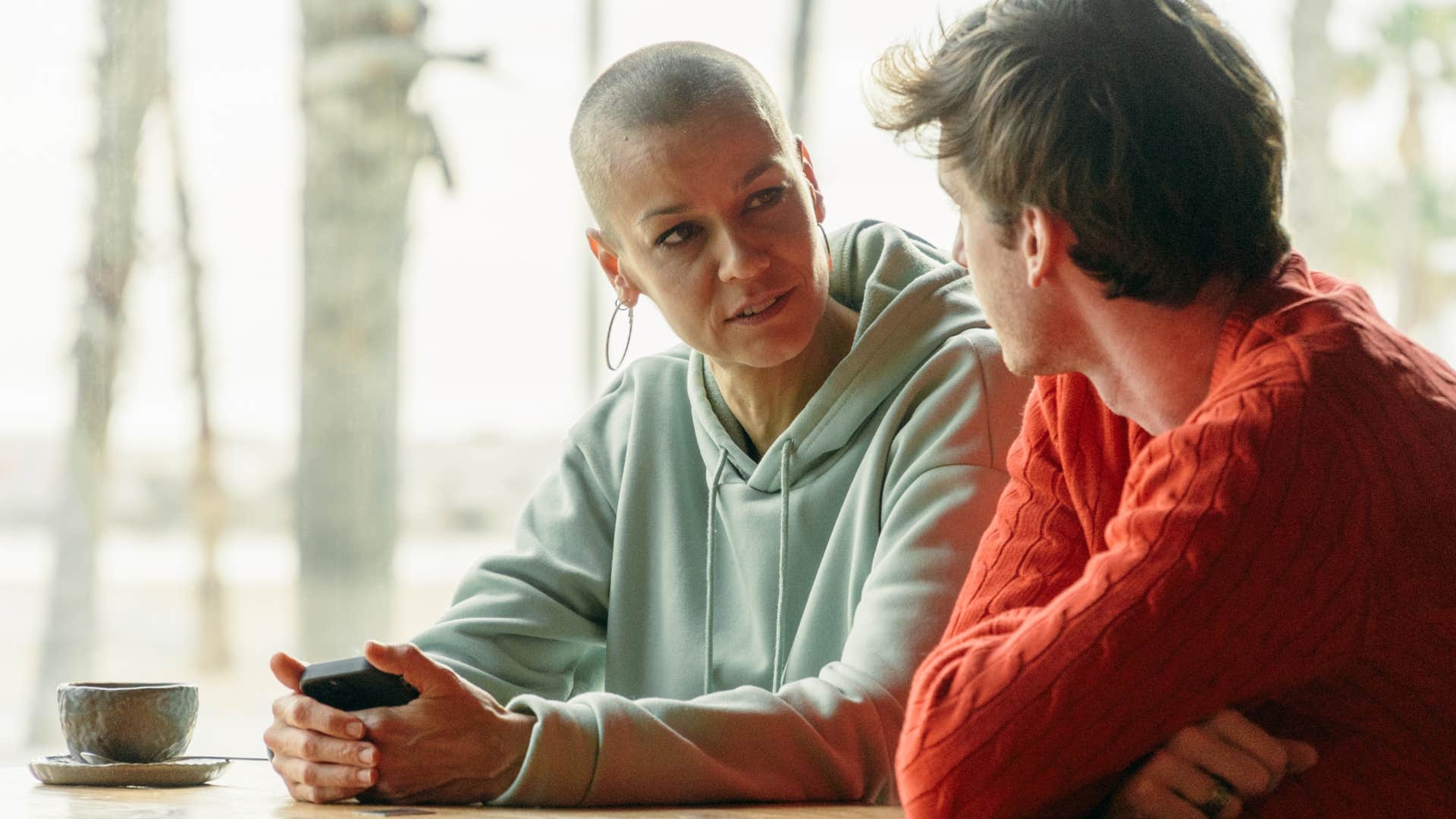11 Brilliant Phrases To Say Instead Of ‘It’s OK’ When Someone Apologizes For Bad Behavior
Not every apology needs to be immediately accepted, especially when you feel pressured to.
 Krakenimages.com | Shutterstock.com
Krakenimages.com | Shutterstock.com Apologies and forgiveness are inevitable parts of relationships — no partner is capable of being “perfect” all of the time, no matter how intentional, empathetic, and healthy they are. According to mental health expert Steven Stosny, Ph.D., not every apology is going to lead to forgiveness, especially when they’re riddled with insecurities, patronizing language, or insincere resolutions.
Instead of blindly accepting these unproductive apologies and harboring resentment down the road, consider using one of the brilliant phrases to say instead of “It’s OK” when someone apologizes for bad behavior, not just to protect your relationship, but also your emotional health setting new boundaries and expectations.
Here are 11 brilliant phrases to say instead of ‘It’s OK’ when someone apologizes for bad behavior
1. ‘I hope this doesn’t happen again’
 Prostock-studio | Shutterstock.com
Prostock-studio | Shutterstock.com
By directly acknowledging someone’s poor behavior, expressing how it made you feel, and setting better boundaries and expectations for the future, relationships have the opportunity to thrive after an apology has been issued.
Instead of blindly accepting an apology with a phrase like “everything is OK,” consider opening up a deeper conversation to get to the root of your broken trust.
Without direct acknowledgement of the issue, the deeper problems in a relationship will not only remain unresolved, but will continue to fester and spark resentment down the road.
2. ‘I’m willing to forgive you this time’
 Fizkes | Shutterstock.com
Fizkes | Shutterstock.com
By maintaining a calm demeanor and being open-minded to forgiveness, people healthily accepting apologies ensure they’re not holding onto grudges or seeking retribution for their partner’s mistakes. Instead, they approach apologies with empathy, figuring out ways to express their emotions and acknowledge their hurt without invalidating their own experience or skipping over important conversations.
According to psychotherapist Amy Morin, forgiveness is essential and inevitable in all relationships — everyone makes mistakes, as not every partner or friend is capable of being “perfect” all of the time.
“Forgiveness is a conscious decision to release feelings of resentment,” Morin adds. “ It's a crucial tool in processing hurt and moving on. Even though you may find forgiveness difficult, it's essential for the long haul.”
3. ‘I need time to heal from this’
 Fizkes | Shutterstock.com
Fizkes | Shutterstock.com
While forgiveness and clear steps to move forward are perfectly healthy ways to respond to an apology, especially in an important or long-term relationship, it’s also acceptable to take extra time to unpack your emotions and think about what you need for the future.
Setting boundaries in response to an apology, with one of the brilliant phrases to say instead of ‘It’s OK’ when someone apologizes for bad behavior, can ensure that your needs won’t go consistently unmet or invalidated moving forward.
According to experts from Solid Ground Counseling and Wellness, forgiving someone has more to do with your own wellbeing than anyone else's. Blindly forgiving someone without addressing your needs only sets you up for future frustration and disappointment, so if you’re choosing to move forward, ensure you set boundaries after receiving your apology.
4. ‘Even if it wasn’t intentional, your words hurt me’
 Fizkes | Shutterstock.com
Fizkes | Shutterstock.com
With a mix of empathy and humility, people responding to apologies can understand that not every violation of trust in a relationship is an inherently malicious act.
Sometimes, the chaos of life, stress, anxiety, and lacking emotional intelligence in passing moments can urge people to act in ways they typically wouldn’t, even in relationships they cherish.
By reminding people you forgive them and pointing out their human tendencies, you can find compromise with people who’ve wronged you — setting a new, clear, and healthy path forward instead of building resentment and frustrating thoughts.
5. ‘Thank you for the apology’
 JLco Julia Amaral | Shutterstock.com
JLco Julia Amaral | Shutterstock.com
Instead of blindly accepting an apology with phrases like “It’s OK,” often dismissing everyone’s true emotional needs, try using a different response like this one to express gratitude, while still leaving the door open for more open and honest communication.
You should never feel obligated to accept someone’s apology without expressing more boundaries or getting the explanation and clarity you need to move forward.
For some people, they might consider taking time to unpack their emotions after using a phrase like this. Others may set boundaries, end a relationship, or even ask for more clarity.
At the end of the day, finding clarity and re-establishing security in a relationship looks uniquely different for everyone, depending on the circumstances, so no response is inherently “right or wrong.”
6. ‘I forgive you, but how do we move forward’
 Monkey Business Images | Shutterstock.com
Monkey Business Images | Shutterstock.com
According to experts from the Cleveland Clinic, feelings of inadequacy or unworthiness often sit at the center of deeper resentful feelings in relationships, stemming from arguments, issues, or conflicts that have been left unacknowledged and unresolved.
Specifically important for people responding to an apology, figuring out what you need to move forward to re-establish trust in a relationship is necessary for the future emotional wellbeing of both partners.
Instead of suggesting that everything “is OK” and moving forward without an open conversation, find ways to forgive with expectation. Set boundaries, schedule open conversations, and find ways to grow together.
7. ‘I hear you, but everything isn’t fine’
 simona pilolla 2 | Shutterstock.com
simona pilolla 2 | Shutterstock.com
If you sense someone is giving you an insincere apology or continues overstepping your boundaries after they’ve asked for forgiveness, reminding them about your emotional wellbeing and expectations can be helpful.
By using one of these brilliant phrases to say instead of “It’s OK” when someone apologizes for bad behavior, you safeguard security in your relationship and fend off resentment, while still clearly expressing your demands for respect.
8. ‘I expect more from my relationships’
 Loreanto | Shutterstock.com
Loreanto | Shutterstock.com
A study published in the Negotiation and Conflict Management Research journal argues that an effective and appropriate apology often combines several different components to re-establish broken trust in relationships, whether they’re intimate, platonic, familial, or professional.
When someone behaviors poorly or intentionally breaks trust in their relationship, they should feel drawn toward making explanations in their apology, alongside empathy, compassion, and clear steps forward, like the study explains.
When you don’t receive that kind of clarity and intentionality in an apology, it’s important to remind people of your clear boundaries and expectations. Don’t overlook the little things, as they often bubble up in unsettlingly resentful ways down the road if left unaddressed.
9. ‘Can you help me understand’
 Alex_Maryna | Shutterstock.com
Alex_Maryna | Shutterstock.com
According to psychologist Ryan Howes, there are four stages to true forgiveness: expressing emotion, understanding the “why,” rebuilding safety, and letting go.
While each serves their own unique purpose for emotional health and relationship fitness, understanding how you’re feeling, why someone’s comments or actions hurt you, and what you need to move forward is most important for establishing a clear path forward, especially in a partnership.
By asking questions about the intention behind someone’s actions or comments, you not only help yourself to move forward and heal, but you ensure you set clear boundaries and expectations for the future, calling out how their behavior made you feel and what you want to be different.
While explanations might not lead you directly to forgiveness without the three other components, it can be a healthy way to open conversation following an apology.
10. ‘How can you reassure me this won’t happen again’
 Krakenimages.com | Shutterstock.com
Krakenimages.com | Shutterstock.com
Especially if you’re moving forward in a relationship with someone who’s caused harm or hurt in your life, finding ways to rebuild safety and security is essential. As Howes adds in his article on forgiveness, “these three elements help us process the event. It’s how I feel, how I understand what happened, [and] how I know it won’t happen again.”
Rebuilding trust may start with an apology, but the communication, boundaries, and reassurance that comes following it is essential to securing a partnership again.
When both people feel comfortable and safe, relationships thrive, but that takes work from both sides to achieve, especially after trust has been sabotaged by hurtful or invalidating behavior.
11. ‘I understand that everyone makes mistakes, but this truly hurt me’
 Mariana_erato | Shutterstock.com
Mariana_erato | Shutterstock.com
Humility is an important part of forgiveness in our relationships, on both sides of the aisle. As psychotherapist Ilene Strauss Cohen, Ph.D. says, reminding ourselves that we’re not superior to anyone else, even when we’ve been harmed by someone in our lives, can ensure they reach positive outcomes following an apology, rather than resentment, guilt, and emotional distress.
Find ways to connect, empathize, and lead with kindness when responding to an apology, so you can both advocate fiercely for yourselves but still ensure you’re not unnecessarily critiquing or judging your partner, friend, or peer.
Zayda Slabbekoorn is a staff writer with a bachelor’s degree in social relations & policy and gender studies who focuses on psychology, relationships, self-help, and human interest stories.

